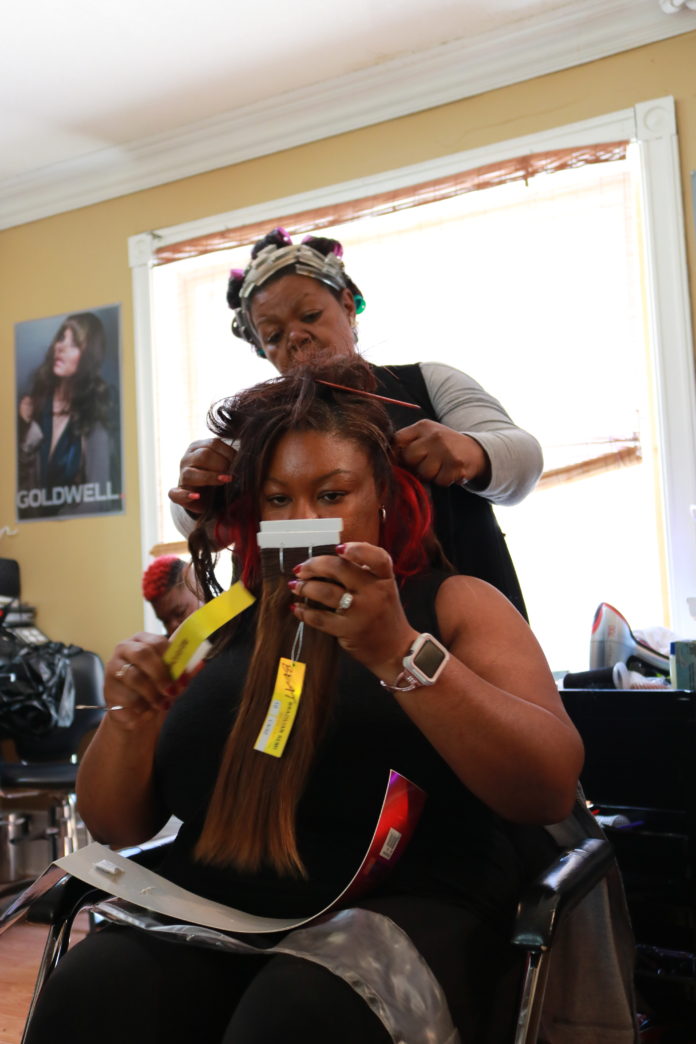A hairstylist once told Sandra Ellis her hair is weird. As a woman of African descent her hair isn’t weird, it’s kinky.
Now a licensed hairstylist, Ellis and student start-up Servill, are determined to help Black women gain confidence in their hair.
“Kinky hair is difficult to manage, and because of the nature of its manageability, it leads a lot of Black women to use harmful chemicals such as relaxers or texturizers to straighten their hair,” she said.
Kinky hair is usually thick and curly. When this hair type is not braided, it resembles an afro and is often challenging to manage.
Ellis said relaxers and texturizers contain substances such as lye, a metal hydroxide which can cause third-degree burns and scalp irritation, leading to severe hair damage and loss.
Ellis said it’s very difficult to find a local hairstylist skilled in Black hair care.
“The salons and hairdressers we have in this community do not know how to cater to Black hair properly and those who do are not licensed hairstylists.”
She said Black women can’t just walk down the street to the nearest salon to get their hair shampooed or braided because the service isn’t available or the stylist on duty may not know how to cater to kinky hair.
Ellis said many Black women rely on word of mouth or go on social media to look for a talented afro hairstylist.
“This can be a hassle because, for instance, someone living in Waterloo may need to travel to Toronto for a hair appointment with a hairstylist they found on the internet,” she said.
Ellis said another reason Black women straighten their hair with relaxers is because beauty standards and stereotypes favour non-African hair types. Culture and the media depict straighter hair and lighter skin as more beautiful.
Black women also face issues when it comes to getting a job because of their hair. In some workplaces, afro hair is not considered professional looking, and there have been cases where black women are refused jobs they are qualified for. Fearing unfair treatment, black women tend to wear expensive wigs, weaves, or extensions to work.
Servill hopes to solve the problem of inaccessibility for Black girls by making hairstyling and beauty services more accessible to them.
They connect to the nearest freelance hairstylist or hair salon and manage their appointments online.
“Some people call it the Uber for hairstylists,” Abbas Safdari, cofounder of Servill, said.
The service allows people to invite a hairstylist to their home or go to the freelancer’s home themselves.
Safdari said safety is paramount for both clients and freelancers.
Ellis said people in the Black community focus on surviving, looking after their kids and paying their bills. For them, a significant social issue is keeping their kids away from drugs and out of prison, not trying to raise awareness about the lack of resources in the beauty industry or licensing.
Ellis also said one of the reasons there aren’t many licensed hairstylists for kinky hair is because licensing tests are in English and many people who have a natural talent for hairdressing do not speak the language. This makes it difficult for them to pass the tests.
The mandatory apprenticeship program for hairstylists in Ontario takes between two to five years to complete and consists of on-the-job training and in-school training, but many women cannot afford the tuition fees and Ellis said, some employers abuse their apprentices and ask them to do menial tasks
Due to these rules, many people go into hairstyling without a license, and damage people’s hair, especially kinky hair. Ellis said she has dealt with many hair damage cases where she had to treat the hair of someone with a bad experience from an unlicensed hairstylist.
Servill is on campus raising awareness about these issues and is trying to solve the problem of finding and connecting people with hair and beauty professionals that understand the needs of Black people.
Both authors are cofounders of Servill and Masters of Business, Entrepreneurship, and Technology students.































